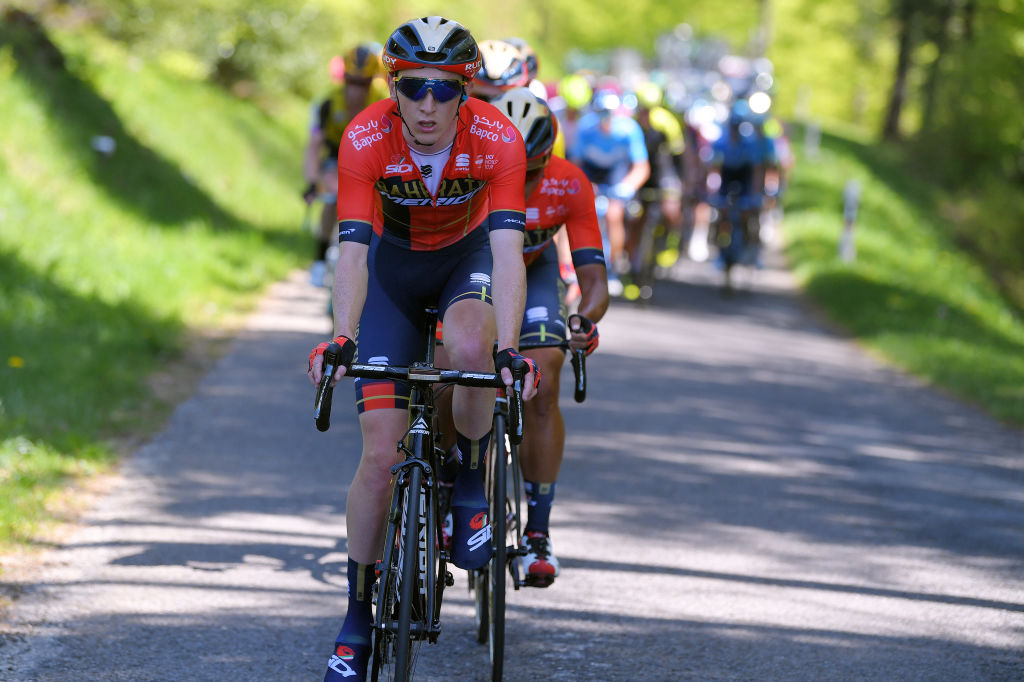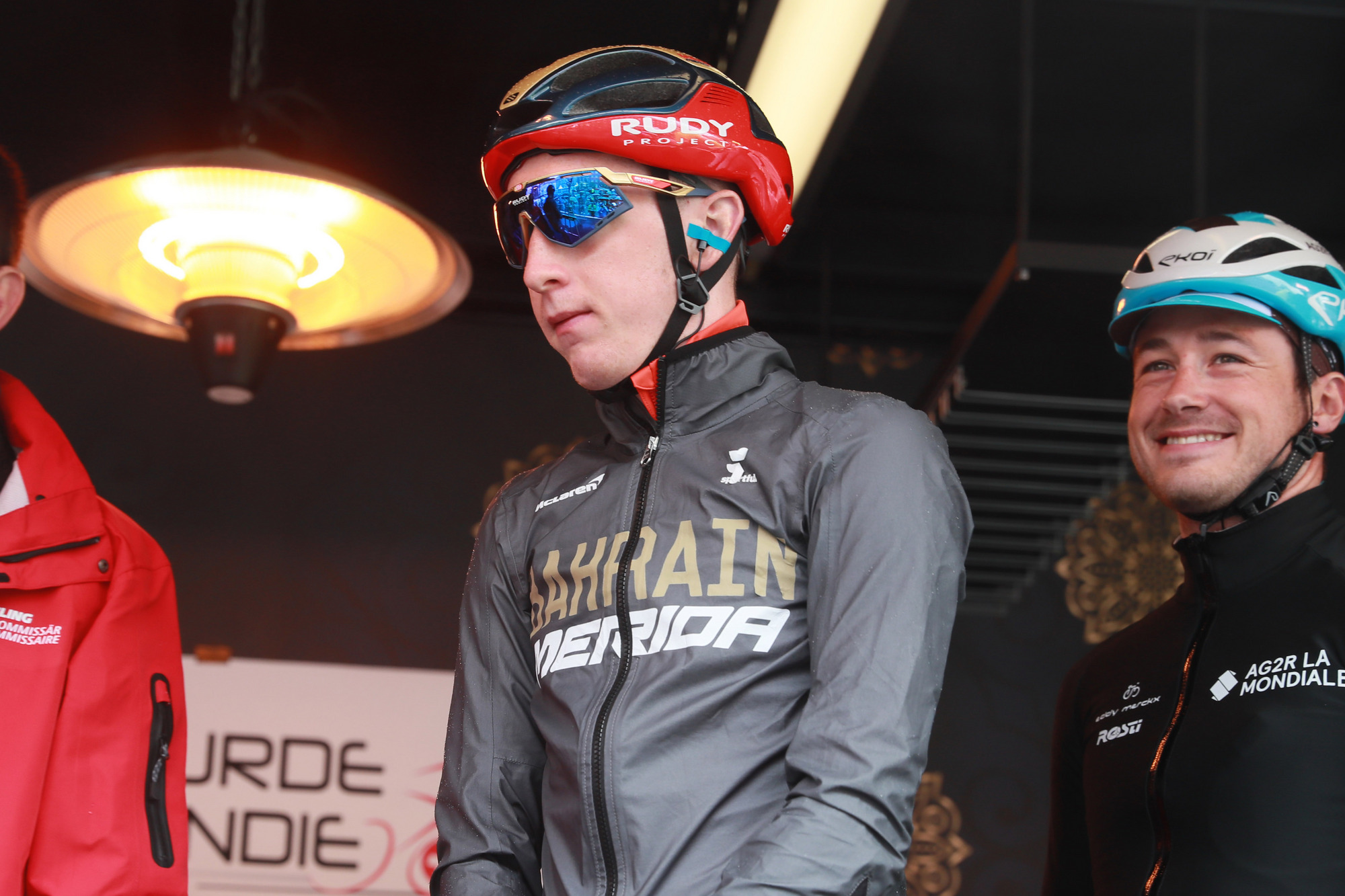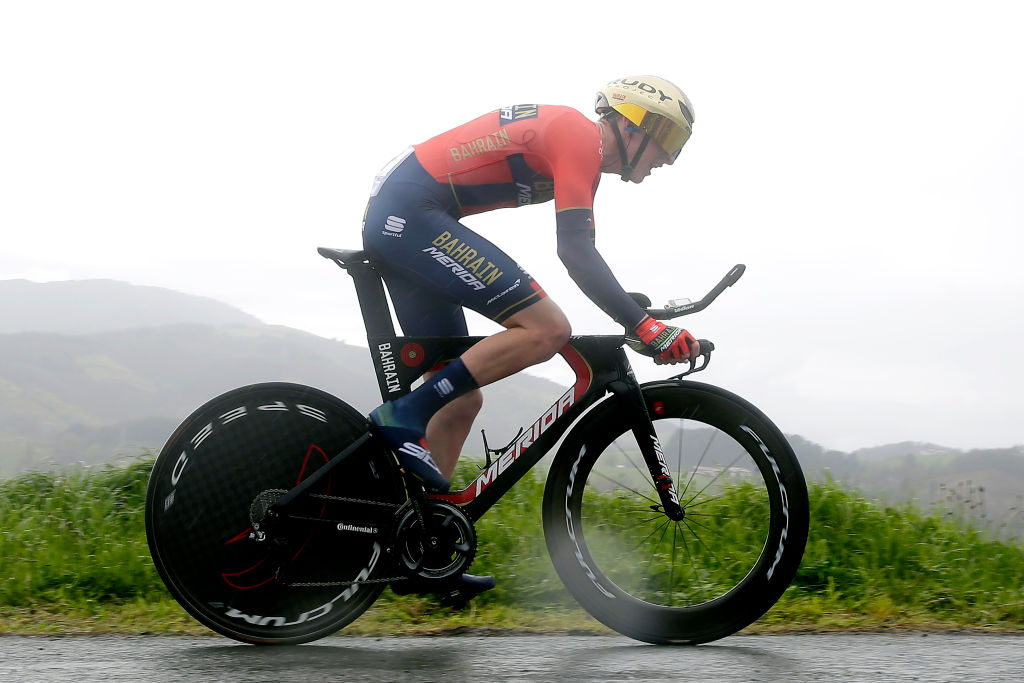Stevie Williams: I'll need a few races to feel like a bike racer again
Bahrain McLaren rider's lonely road back from knee injury unchanged by empty calendar



With bike races suspended due to the coronavirus pandemic, most professional cyclists find themselves cast adrift, treading water on their home trainers. Stevie Williams, by contrast, is a rare rider who finds himself plotting a steadfast course through these uncharted times.
"I want to feel like a bike racer again," Williams tells Cyclingnews from his home in Aberystwyth, in Wales, where he is continuing his steady rehabilitation after undergoing surgery to remove the small fabella bone from his left knee in November.
The Bahrain McLaren rider had no definite return date in mind before the coronavirus pandemic interrupted the cycling season and, save for the closure of his local gym, his regimen remains more or less intact. Unlike the bulk of his WorldTour peers, Williams' objective is precisely the same as it was before the schedule was emptied, given that his calendar never had any fixed dates on it to begin with.
"The plan was to get racing this year. There was no date set, and no race planned to come back to. It was all based on seeing how I recovered, really," he says. "There's been no pressure at all from the team; it's been a really good collaboration with them. It's just about getting back healthy again and seeing where we're at once I'm back fully training."
Williams made his first, tentative foray onto the road at the beginning of February, riding for little more than half an hour before turning for home. In the meantime, he has gradually added mileage. Unlike their counterparts in many other European countries, British professionals are able to train outdoors so long as they adhere to social-distancing protocols, although Williams has taken care to limit his own solo sorties to circuits near his family home.
"I literally just got back from a three-hour ride now, and I've improved pretty considerably over the last month or so," he says. "I'm about five months down the line now since surgery, and it's going a lot better than it was previously.
"I'm doing maybe 12 or 14-hour weeks on the bike now, with a few home-gym sessions thrown in as well. After the surgery, it takes a lot of time for the inflammation to go down, but the scar's healed wonderfully. I'm still in rehab, and not in full training yet. I'm just getting back into it still."
Get The Leadout Newsletter
The latest race content, interviews, features, reviews and expert buying guides, direct to your inbox!

The autumn diagnosis and subsequent surgery drew a line under a trying debut season at WorldTour level for Williams, where persistent knee pain limited him to just eight race days. He had entered the professional ranks on a high after landing that most vaunted indicator of climbing potential, the Ronde de l'Isard, in his final year as an under-23, but as early as his Bahrain-Merida team's January 2019 training camp, it was apparent that his initiation would be a deferred one.
After undergoing treatment at football club Manchester City's medical centre, Williams made abortive attempts to start his season at the Tour of the Basque Country and the Tour de Romandie, abandoning on each occasion. The remainder of the campaign was spent trying to find the root cause of the problem.
"It was really tough – the hardest thing I've gone through and something I wouldn't wish on anybody, not even my worst enemy," Williams says. "When you work hard through the amateur and under-23 scene and get to the WorldTour, you want to build on what you've already done and ride all the biggest races. There have been some dark times this last year, but it's nice to finally see some light at the end of the tunnel."
Williams' cycling career began in part because of Osgood-Schlatter disease – an inflammation of the patellar ligament – brought a halt to his time as a footballer as a teenager, but his knee problem of last year was, he says, completely unrelated. Surgeons at the Fortius Clinic in London eventually identified the issue: a compressive tendinopathy, and suggested a fix, namely the removal of the fabella.
"We just needed to get that bone out to let the tendinopathy heal naturally," Williams says. "It was pretty rare, pretty strange, but everything seems to be going in the right direction now."
The future
Cycling is no fairytale, Charly Wegelius wrote in Domestique. It's no Frank Capra film, either. A rider stricken by long-term injury is compelled to bear witness to the harshest of truths: cycling life goes on remorselessly without him.
During Williams' time on the sidelines, his team changed its title sponsor (McLaren replaced Merida), its manager (Rod Ellingworth replaced Brent Copeland) and its marquee riders (Mikel Landa replaced Vincenzo Nibali). Even the joy of quietly resuming training on the road in February was countered by the realisation that the rest of the peloton was already engaging in full-throated competition.
"I was finding it difficult a few months ago when I was doing my rehab stuff – doing 30 or 40 minutes on the bike and then having to come home and see races on the TV. That was pretty tricky, mentally," Williams says.
Now, suddenly, all of cycling has ground to a halt, although Williams hasn't given a second thought to whether that will make his eventual return to racing any less daunting. Each day, Williams rides through what he terms "ghost towns" in the hinterland of Aberystwyth – a visual reminder, if it were needed, that the interruption of the cycling season is a rather minor footnote to the larger context of the COVID-19 pandemic.

"It's just a really sad time," he says. "It's a strange situation and it's absolutely awful for everybody. I hope all this is done as soon as possible and everybody can get back to normal."
Williams is in the second year of his contract with Bahrain McLaren, although he admits that his lack of racing in their colours means that he still considers himself a neophyte.
"I still definitely feel like a neo-pro; I haven't settled into pro racing yet. I'll need a few races under my belt to get back to myself, and just to feel like a bike racer again," he says.
He is also in the final year of his contract with Bahrain McLaren, and, like so many others in the peloton, he will hope there is at least the chance to earn a new one in the months ahead. If not, Williams' amateur resumé and his youth – he is still only 23 – are compelling arguments in his favour, despite the inevitably depressed market. His Bahrain McLaren team is just one of many WorldTour squads to impose salary cuts due to the coronavirus pandemic.
"I don't know my future yet, but the team definitely stands behind me," Williams says. "Basically, I hope I can get back to racing before the end of the season, get a few stage races under my belt and prove I can race again. Hopefully then I can, fingers crossed, have another opportunity and another go at riding pro."
Until then, Williams will continue on his lonesome road to recovery. He had expected that his spring would at least have been shortened by the prospect of his beloved Liverpool claiming the first league title of his lifetime. Instead, with football on an indefinite hiatus, the long vigil continues. Certainty is nowhere to be found in 2020.
"Liverpool haven't won the league in 30 years. They're 25 points clear and then the world is hit with a virus. You couldn't make it up," Williams says. "I hope the season does finish fairly, but the most important thing is the world at large – not sport."

Barry Ryan was Head of Features at Cyclingnews. He has covered professional cycling since 2010, reporting from the Tour de France, Giro d’Italia and events from Argentina to Japan. His writing has appeared in The Independent, Procycling and Cycling Plus. He is the author of The Ascent: Sean Kelly, Stephen Roche and the Rise of Irish Cycling’s Golden Generation, published by Gill Books.